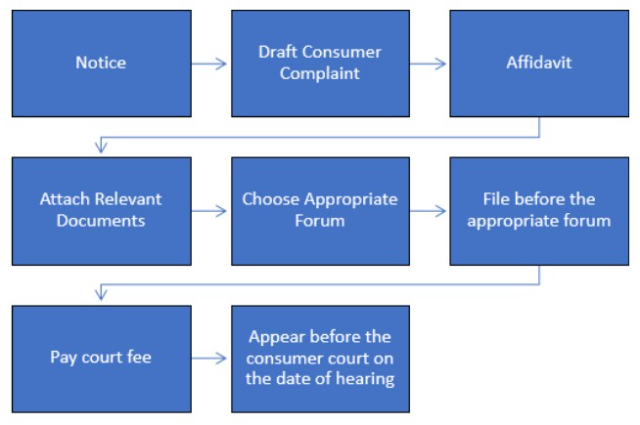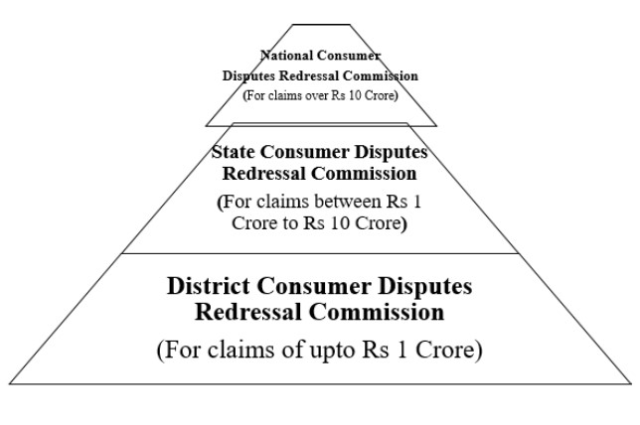INTRODUCTION
We all as consumers of goods and services have been cheated or misled in one way or the other. Be it provided with inferior/defective quality of goods, provided with less quantity than demanded or asked to pay excessive price than the MRP, or experienced deficiency in services in the restaurants, banks, airports, hospitality to name a few.
In India, consumer grievances are protected through legislations such as the Consumer Protection Act, 1986 and its subsequent amendments to Consumer Protection Act, 2019. Any person who is categorized as a ‘Consumer’ under the act and has been aggrieved by the defect in goods or services, can lodge a complaint either by themselves or through any lawyer. The Act provides for establishment of consumer courts(forums) in each district and states that ensures that consumers grievances are resolved expeditiously.
This article will provide a detailed guide on how an aggrieved consumer can file a complaint in the consumer court.
THE CONSUMER PROTECTION ACT, 2019
The consumer protection Act first came into force in the year 1986 with the aim to provide expeditious redressal and adjudication upon matters pertaining to consumer grievances. Subsequently, the act was amended in the year 2019 thereby replacing the Consumer Protection Act, 1986 to bring in more efficiency in e-filing and mediation of consumer disputes.
WHO IS A CONSUMER?
- Any person can be classified as a consumer if the following conditions are satisfied.- He/She has purchased some goods or availed services in exchange of a price i.e., either paid money in part or full.
- He/She has not purchased the goods or availed services for the purposes of resale or commercial purposes. - A consumer
- Voluntary association of consumers registered under any law for the time-being in force
- Central or State government
- Central authority
- One or more consumers with the same interest
- In case of death of consumer, his legal heirs or legal representatives(lawyers)
- If consumer is a minor (i.e., under 18 years of age), in that case their parents or legal guardians.
WHO CAN FILE A CONSUMER COMPLAINT?
Any person who falls into the category of “consumer” under the act can file their own consumer complaint in the consumer court provided they have the legal capacity to do so i.e., he is sane, solvent and a major. The consumer can also file their complaint through a legal representative.
WHEN CAN A COMPLAINT BE FILED?
Any person who falls within the ambit of the definition of “consumer” can file a consumer complaint either by themselves or through their legal representatives if any of the following grounds are fulfilled:
- Unfair trade practice by the service provider
- Defective goods
- Deficiency in services
- Overcharging of goods and services
- Hazardous goods or services
THE PROCEDURE TO FILE COMPLAINT: A STEP-BY-STEP GUIDE

A. Notice:
Although this step is optional, the aggrieved consumer can intimate his intention to take legal action against the service provider. The legal notice could also include details of defects in the product or deficiency in service. This step is simply an attempt to settle the issue without approaching the consumer forum, if perhaps the service provider is willing to compensate or repair the defect without approaching the forum.
B. Draft Consumer Complaint:
The most crucial step and perhaps the next step after sending intimation through a legal notice. If the service provider is not willing to offer help or compensate the aggrieved consumer even after sending a legal notice, then the next step under Consumer Protection Act is to file a consumer complaint before the consumer forum. A consumer complaint can be drafted either by the aggrieved consumer or through a legal representative.
The following contents must be included in the consumer complaint:
- Name, description, address of the complainant/aggrieved consumer
- Name description and address of the opposite party/parties (parties may include service provider/shopkeeper and the manufacturer)
- Cause title i.e., the complaint should have a heading (forum’s name, parties name and a subject-line)
- Relevant facts/situation: it must include the date, time and place of the incident.
- It must also include how the opposite party/parties are responsible and why should they be held liable to compensate the aggrieved consumer.
- Mention jurisdiction and explain why the said jurisdiction i.e., whether any of the parties resides, works, has a head office or works for profit within the chosen jurisdiction.
- Attach necessary documents such as bill, receipts etc. that will corroborate your stand as narrated in the complaint.
- All the relief and remedies claimed. Remember, you also have a right to seek reimbursement from the opposite party, so include the cost of litigation as well apart from cost of damage in your complaint.
- Sign and Verification by the complainant
C. File Affidavit:
The complainant/ aggrieved consumer who files the complaint has to file an affidavit along with the complaint in the consumer forum stating that the facts presented and the statements made are true and correct to the best of their knowledge.
D. Attach relevant documents:
- Copy of bill or receipt of the product/service.
- Receipt of the product delivery, if ordered online
- Package of the product
- Record of online booking of product
- Warranty or guarantee card of the product
- Copy of notice sent to the manufacturer or seller
E. Choosing the Appropriate Forum
There are three forums that have been established under the act to expeditiously dispose of the grievances- District Consumer Disputes Redressal Commission, State Consumer Disputes commissions and National Consumer Disputes Redressal Commission. Before choosing the forum, one should look at their amount of claim.
- If the claim is up to Rs 1 Crore, then the complainant should approach the district commission.
- If the claim more than 1 crore but up to 10 Crore, then the complaint should be registered before the State commission.
- If the claim is over 10 Crore, then the aggrieved should approach the National Commission.
F. Depositing Court Fee:
Along with complaint the consumer has to deposit a court fee. The amount of court fee differs with each commission. It also depends on the value of goods and compensation sought from the opposite parties. The value of court fee is explained in detail in the subsequent paragraphs.
G. Time Limit:
The complaint should be filed within two years from the date of defect in the product or deficiency in service or when the cause of action arose. The same can also be filed after the statutory period of two years provided the district forum is satisfied that the consumer has sufficient reason for filing beyond the statutory period.
H. Relief:
The following reliefs can be granted by the consumer forum; however, the list is not exhaustive and it depends on the commission and the claim/relief prayed by the consumer:
- Refund of entire amount of product plus compensation for damages suffered (if any) plus Cost of litigation (only if claimed by the aggrieved consumer in his/her complaint)
- An order to remove/amend the defect in product or service, if possible
- Return of product purchased, if possible
- Monetary compensation to the aggrieved person, if it is proved that physical or mental harm or loss was caused to the person.
- Order to ban hazardous products completely
- Order to discontinue unfair/restrictive trade practice
I. Appeal:
Consumer aggrieved from the decision of the forum can always approach the subsequent superior forum.
- Consumer aggrieved/dissatisfied by the decision of the district commission can approach the state commission
- If dissatisfied by the decision of the state commission, then the consumer can approach the National Commission.
- If dissatisfied by the decision of the National Commission, then the consumer can approach the Supreme court of India.
CONSUMER REDRESSAL AGENCIES IN INDIA AND HOW TO APPROACH THEM?

There are three forums that have been established under the act to expeditiously dispose of the grievances-District Consumer Disputes Redressal Commission, State Consumer Disputes Redressal Commission and National Consumer Disputes Redressal Commission. Before approaching any of the forum, one needs to look at the worth of their claims. As mentioned above, for claims up to Rs 1 crore, one should approach the district commission, for claims from more than Rs 1 Crore to Rs 10 Crore one should file their complaint before the State Commission and for claims over Rs 10 Crore One should approach the National Commission.
A. District Consumer Disputes Redressal Commission:
- Complaint has to be printed on a plain paper, notarized at the notary office and then submitted either by the aggrieved consumer himself or though his legal representative.
- Number of copies to be filed at the forum: Four copies and extra copies for each opposite parties.
- Court fee to be paid
- The court fee is to be submitted through Demand Draft in favour of the Consumer Disputes Redressal Forum (name of district to be added)
B. State Consumer Disputes Redressal Commission:
- There are two ways to approach a state commission: Either by filing an appeal against the order of the District Forum which has to done within 30 days from the date of order of the District Forum OR the consumer may file directly an appeal before the State commission, if it satisfies the pecuniary jurisdiction criteria i.e., the claim is between Rs 1 Crore to Rs 10 Crore.
- Documents Required:
- Four copies of complaint and additional copies to be given to each of the opposite parties.
- Copy of order of the District Forum(certified)
- The copy of complaint filed before the district forum and other additional materials placed on record before the district forum.
- Copy of interim orders passed by the District Forum
- Affidavit - The value of court fee to be calculated and paid along with the complaint. However, no fee for filing an appeal before the State Commission.
- The court fee is to be paid by way of Demand Draft in favor of Registrar, Name of the State Commission (payable in that state only)
C. National Consumer Disputes Redressal Commission:
- There are two ways to approach a National commission: Either by filing an appeal against the order of the State Commission which has to done within 30 days from the date of order of the State Commission OR the consumer may file directly an appeal before the National commission, if it satisfies the pecuniary jurisdiction criteria i.e., the claim of over Rs 10 Crore.
- Value of court fee has to be paid by way of Demand Draft to be paid in the favor of Registrar, National Consumer Disputes Redressal Commission. (No fee for filing an appeal before the National Commission)
CONCLUSION
Therefore, any person who comes within the meaning of 'consumer' and has been aggrieved by defect in goods or services can file their own consumer complaint case before the consumer courts in India within two years from the date of defective product or deficiency in services. They can also file a consumer complaint through a lawyer.


